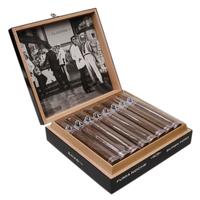Ok, I know there are 1,001 threads discussing the various attributes of vulcanite and/or/vs acrylic stems - that's what makes it difficult to find the basic information I'm looking for, so please forgive another post asking this question.
What is the most advisable way to go through my pipes and discern which stem is vulcanite and which is acrylic? I know the acrylic is harder and the vulcanite oxidizes, but without giving each a bite test or waiting for oxidation to appear, is there a simple (and advisable - I know some of of you well enough by now, someone will tell me to saw them in half or something, lol) way to distinguish my stems?
Is there a known thread already discussing this that someone could point me to in lieu of this becoming a duplicate and superfluous post?
Thanks in advance!
What is the most advisable way to go through my pipes and discern which stem is vulcanite and which is acrylic? I know the acrylic is harder and the vulcanite oxidizes, but without giving each a bite test or waiting for oxidation to appear, is there a simple (and advisable - I know some of of you well enough by now, someone will tell me to saw them in half or something, lol) way to distinguish my stems?
Is there a known thread already discussing this that someone could point me to in lieu of this becoming a duplicate and superfluous post?
Thanks in advance!









